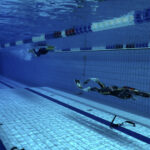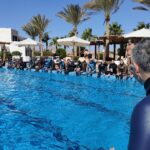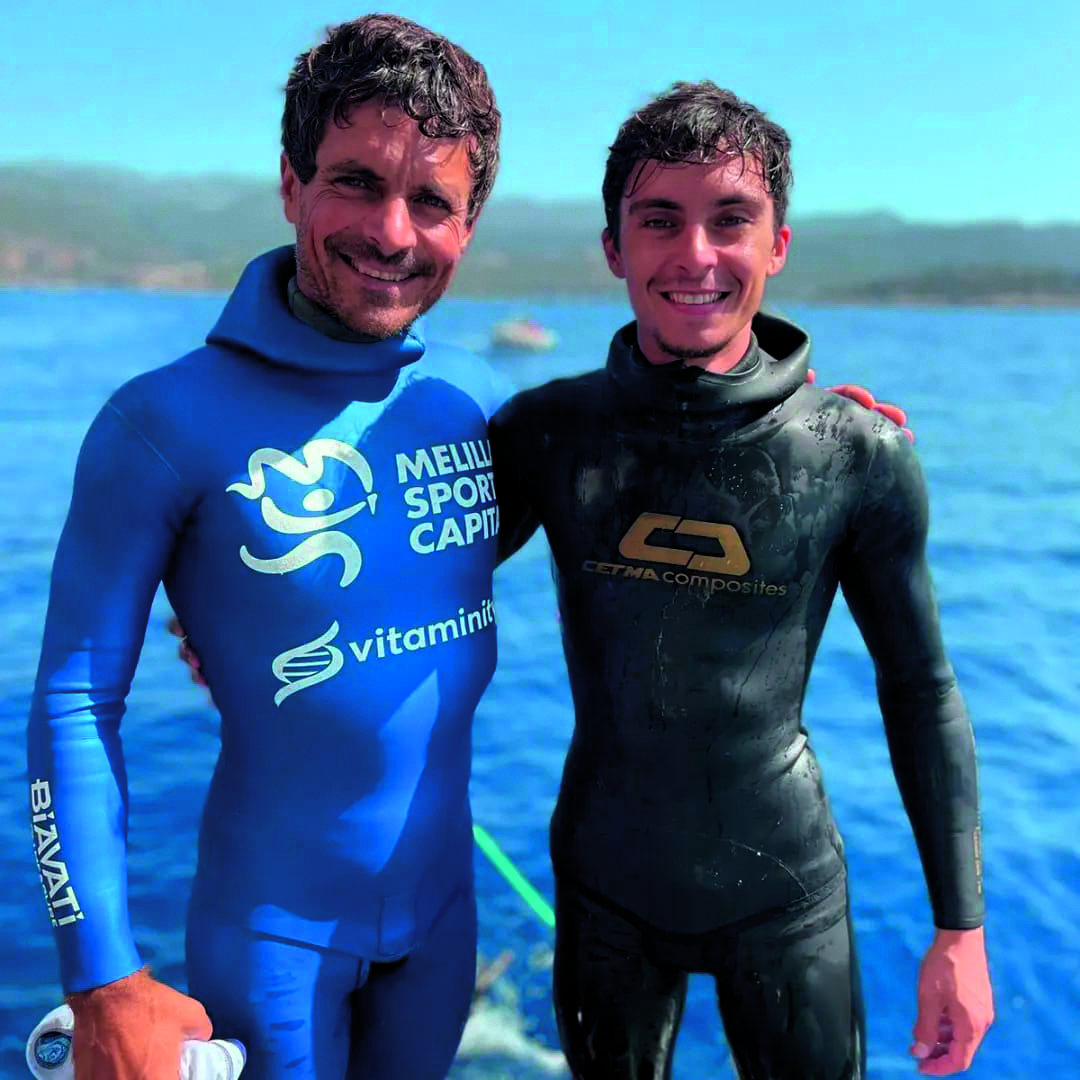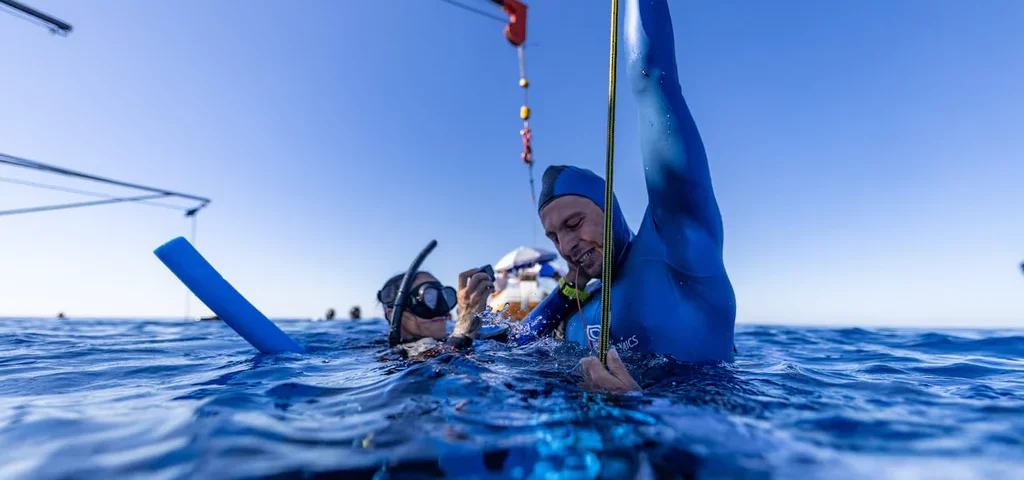Kas World Championship

Cristina Francone: A War Machine!
11 September 2023
Andrea Zuccari: What is the future of freediving?
11 September 2023During the "still waters," we heard the opinions of the Italian athletes on how the competitions went. Joys, disappointments, unfulfilled expectations, and plans for the future
by Stefano Tovaglieri
A total of 140 athletes representing 40 countries took part in the outdoor apnea World Championship in Kas, Turkey. There were even unprecedented national teams like Saudi Arabia, Lebanon, Iran, Afghanistan, Kuwait, Syria, Sierra Leone, which expanded the popularity of this sport, revealing new horizons. Representing Italy were Davide Carrera, Vincenzo Ferri, and Antonio Mogavero, and among the women, Alessia Zecchini and Simona Auteri.
Four competitions were scheduled: constant weight with monofin, free immersion, no-fins apnea (frog style), and constant weight with bi-fins (which was canceled due to adverse weather conditions).
We've already discussed results, rankings, and more in the last issue. Now, we want to tell you what happened, straight from the voices of the Italian athletes.
So, what can you tell us about your World Championship?
Davide Carrera: "Overall, I'm happy. Perhaps, a bit of regret for not declaring a couple more meters in the constant weight with monofin. Those depths were already achieved during training this year and well within my capabilities. I felt confident about them. However, the weather and sea conditions were uncertain, and I was concerned about the possibility of worsening conditions during the competition. So, I decided to be more conservative, reaching 121 meters compared to the Frenchman Arnauld Jerald's 123 meters. Still, I'm content with the second place because I had a tough winter, during which I had to find sponsors to support myself financially and continue my training. I wasn't completely at ease. The monofin event is my specialty; it's my dream. Achieving a world record is my goal; I've been thinking about it for a long time, and lately, I've been feeling it's more and more possible. Although most of my training was focused on the monofin, I also competed in the frog style because I enjoy it, swimming with a lightweight wetsuit and experiencing a sense of freedom in the depths. It's a shame the bi-fins event was canceled. I felt ready to attempt the Italian record with 106 meters, but the sea had other plans."
Simona Auteri: "In the team, I was a 'novice,' and everything was a new experience for me. I realized the importance of team spirit, understanding how to empathize, not getting too carried away with personal victories, as some teammates may not have had the same success. But also not feeling alone when frustration arises after one's own failures. Spending 24 hours a day with living legends like Alessia, Davide, Antonio, and Vincenzo was an incredible emotion. I learned so much, from nutrition to dry training. Being with the team allowed me to absorb a lot of knowledge in a relatively short time. On my own, it would have taken months or even years! When I arrived in Kas, after the success at the Italian Championship on Lake Garda, my goal was to increase my depths to become more competitive. In the early weeks, progress was excellent, and I achieved personal records with almost every dive. Unfortunately, I suffered a neck injury that caused severe dizziness and vomiting, even after a hospital visit. Still, I managed to recover for the pre-World Championship competition, the Kas Baska World Cup, where I reached the top of the podium with 91 meters in the constant weight with monofin. It was a personal record and a gold medal, followed by a silver medal with 75 meters in bi-fins. I've been told that I am the third Italian woman in history to surpass 90 meters in constant weight. A great satisfaction in just two years of training! However, the competitions for the World Championship titles are a different story. I couldn't perform as I wanted. I had congestion in my upper airways, making it impossible to equalize during the constant weight event. I had registered with 91 meters, the same depth I achieved in the Kas Baska competition. It's a shame! I would have been in fourth place. And what can I say about the last scheduled event: constant weight with bi-fins? For me and my teammates, Vincenzo Ferri and Alessia Zecchini, it could have been a chance for redemption after the below-par performances in the preceding days, but unfortunately, it was canceled due to bad weather."
Alessia Zecchini: "Before the World Championship, my training went really well, which gave me special motivation. It went so well that I adjusted my goals a bit with my coaches Gianfranco Concas and Andrea Laureti. My problem was with sleep, but I managed it. During training, I had to wake up at 5 am to have enough time to warm up with stretching and breathing exercises; then, the official sessions started at 7:15 am. This, together with the early morning Muslim prayers, disrupted my sleep patterns. In the end, I found myself much more tired than I had ever imagined. The Kas Baska competition didn't go well at all. I wanted to break the world record for bi-fins, for which I had trained very hard, but it wasn't meant to be. However, during training, I had achieved 106 meters several times with a good margin of strength and equalization. In the first event of the championship (constant weight with monofin), I played it conservatively to save energy for the following days, for the Free Immersion and bi-fins events. But things didn't go as I had hoped. In Free Immersion, I attempted the world record I had longed for, despite knowing that I wasn't fully prepared for it, especially due to the lack of proper sleep. As a result, I blacked out just a few meters from the surface. Then, after a day's break, there was the bi-fins event. I had declared a depth well within my capabilities, but apparently, I was tired, too tired; I believe that the poor sleep made the difference, and I didn't complete the performance validation protocol on the surface. Finally, the last event was canceled due to bad weather. Honestly, it was the worst World Championship in my competitive history."
Antonio Mogavero: "After the pandemic and the arm injury I had in 2020, which required a lot of rehabilitation and more, 2021 was a difficult and tough year for me. I had very few income sources and had to support the entire season. This year, however, was a comeback! It was a top-notch world championship! During the Kas Baska competition, I reached 111 meters with the monofin, a dive that earned me the silver medal behind Davide. It was an excellent start, and it motivated me, allowing me to return home with two bronze medals. It felt like touching the sky with a finger. I had achieved the same feat in 2018, also here in Kas, and replicating it after four years was something magnificent. It was the right reward for all the study and hard work I've put in over these years. Training for hours every day and balancing commitments and goals with trying to have a somewhat normal life at 25 years old can be really tough. But being on the podium twice has made up for all the hardships and has given me renewed motivations to look ahead."
Vincenzo Ferri: "Unfortunately, it didn't go as I hoped. I arrived at the competition feeling empty, too tired. I completely mishandled the approach to the most crucial events of the season. In short, I experienced two consecutive blackouts, the first during Kas Baska, the pre-world championship competition, and then during the monofin dive. And to top it all off, the last competition was canceled. Now I need to reset and recharge for the next season."
Which team surprised you the most?
Geraci: "Definitely the Croatian team; they have an extremely high technical level."
Carrera: "I was impressed by the number of participants from France and Saudi Arabia. There were so many freedivers representing their countries. I understand and agree with our federation's decision to select a smaller group and allow us to stay in Kas in the weeks leading up to the championship for training. However, it would be nice in the future, if possible, to invite more athletes, even masters, with the goal of increasing the medal count and building a stronger team spirit."
Auteri: "The Croatian team thrilled me. They won the most medals and demonstrated the importance of team cohesion, strong friendship, and mutual coaching among all the members. Even though our sport is individual, the team dynamics have a huge impact on each athlete's performance, and they showed that."
Zecchini: "I'm delighted with the participation of Eastern countries. Having freedivers from Iran, Saudi Arabia, Afghanistan, Israel, Kuwait, Syria was fantastic. It's an important sign of how competitive apnea is gaining favor among many enthusiasts." Mogavero: "No specific national team stood out to me. In short, there was nothing new compared to previous editions."
Ferri: "Definitely Croatia. Their athletes achieved incredible results. I was particularly impressed by their ability to maintain a high level of performance turnover. In recent years, we have witnessed the rise of truly exceptional names, great freedivers capable of setting world records like Goran Colak, as well as newcomers like Petar Klovar, who amazed everyone. Another team that is consistently growing is France, in both their male and female components. They present new and high-profile athletes each year, indicating, in my opinion, a strong youth movement behind their success."

Emerging athletes who surprised you?
Geraci: "Croatian Klovar. His dive to 132 meters was remarkable! He also excelled in other competitions. Truly talented."
Carrera: "Klovar, without a doubt. He's a giant freediver, in every sense! He possesses a strength in the water that seems superhuman. Just consider his impressive 132 meters, which made a significant difference compared to a great athlete like Alexey Molchanov."
Auteri: "Ukraine's Kate Sadurskaya. With a past in synchronized swimming at an Olympic level, she won two gold medals. I met her in Kas last year and saw her again in Dahab, at the Blue Hole, in February. The war had just broken out, and she was devastated. In March, I organized a pool challenge to raise funds to send to friends in Ukraine, and I asked her to participate. At first, she declined, feeling guilty for living a normal life far from her country while her friends and relatives back home had no certainties. Then she changed her mind and took part, achieving the highest number of laps in apnea in one hour. She was truly remarkable! She outperformed both men and women, winning the challenge. It was a pleasure to see her win many competitions this season."
Zecchini: "Well, it's almost obvious: Klovar. He's genuinely a champion. I'm sure he'll achieve great success."
Mogavero: "In the women's category, Sadurska surprised everyone. Also, my French friend Guillaume Bourdilla, who holds several titles in indoor disciplines, dynamic events, and a record of over 300 meters in dynamic with monofin, impressed me. In a short time, he has already reached 110 meters in depth with the monofin and with great ease. He just needs to optimize his equalization techniques." Ferri: "Klovar surprised everyone! He's an emerging athlete, with incredible muscle power and freediving skills. He's really tough! His dive to 132 meters in free immersion was exceptional, setting the deepest performance ever in the history of the free immersion discipline."
What technical details do you think made the difference in various disciplines?
Geraci: "Observing many athletes, I can tell you that nothing is left to chance nowadays. I noticed greater attention to exhaling and a continuous effort to decrease the immersion time. Athletes have realized that long times are too challenging to manage in terms of hypoxia and narcosis, so they have accelerated while trying not to strain too much physically, focusing more on technique. For example, Klovar executed extremely fast and short arm pulls from the bottom to 75 meters (a technique called "tapparella"), and only then switched to the classic technique with longer pulls and exploiting the glide."
Carrera: "Certainly, the evolution of materials is driving significant technological innovation in equipment. Cetma and Molchanov, in particular, are producing truly innovative products that provide significant advantages."
Auteri: "My coach, Gus Kreivenas, always tells me: '...don't change something if it's not broken.' This applies to equipment, as well as technical habits. If something has always worked, and we can still progress, there's no need to introduce changes. Unfortunately, in the monofin competition, I had to change my equalization method. I usually keep the tubes open at constant pressure during hands-free diving, but the severe congestion prevented me from doing so. I had to push much harder and introduced sequential equalization. I still managed the first meters of the dive, which are critical, but then I was so focused on equalizing that I didn't hear the alarms. Embarrassingly, I found myself doing the second pack at 50 meters and stopped kicking at 70 meters. I had completely lost the sense of depth and turned before reaching the plate, at 75 meters."
Zecchini: "In the monofin competition, where the most significant depths are reached, the equalization protocol will be crucial. Then, managing narcosis, which I believe is directly proportional to deep training and the time available for training. This year, I made significant progress in managing narcosis. In free immersion, it's crucial to change the pace. Some athletes showed it this year, with fast and short pulls from the bottom and then lengthening the stroke on the way up. In breaststroke, I need to regain control, as I've neglected it a bit lately. I will work on it in the pool to optimize underwater propulsion by improving my leg and arm movements. I still have a lot to work on in terms of technique. Finally, in the constant weight with two fins discipline, like in the other events, it will be essential to refine the race pace to optimize energy. The new kicking technique, the new fins, and the evolution of equalization protocols are favoring increasingly deeper performances. This is the discipline that currently interests me the most."
Mogavero: "There were many technical details that mattered! The availability of training footage was crucial. Being able to analyze every moment and create a real and precise performance model allowed us to make changes, corrections, and winning strategies. Every single dive was studied at home. Analyzing every meter of the race and then trying to refine all the imperfections was very helpful. Thanks to the video footage taken with Diveye, for example, I was able to identify technical imperfections in my breaststroke that I could partially correct. It's definitely an athletic gesture that I need to completely review in some aspects. In short, there's still a lot of work to be done."
Ferri: "To go deeper in each discipline, it's essential to focus on the technique from all angles: equipment, technical execution, breathing, physical preparation... Having a perfect technique is no longer enough. It's true! It allows the athlete to consume less energy and increase depth with more relaxation, but now every detail makes a difference, including nutrition and dietary supplementation."
Managing such an important week of competition like the World Championships is demanding; nothing can be left to chance. How did you prepare in terms of nutrition and activation, timing and recovery after the race, mental management, and technique?
Geraci: "For me, it was easy! With lots of beer!"
Carrera: "Managing an extended period of training and competitions is really demanding, especially mentally. It requires mental preparation and a bit of spirituality, which is essential to find some connection with the universe and draw energy from this intimacy. Rest is fundamental; Alessia showed it! Some distractions, like a walk or snorkeling in the sea, are also helpful in easing performance anxiety. I pay close attention to my nutrition, especially during competitions. I try to consume alkaline foods to counteract the oxidative stress of performances."
Auteri: "It was interesting to share the preparation with the team. Observing Davide's, Antonio's nutrition, or Alessia and Vincenzo's dedication and training frequency was really useful and interesting. Following my coach's advice, I usually take 3 or 4 days of rest before the competition. On this occasion, there wasn't enough time. The Kas Baska World Cup was just two days before the monofin event, and maybe I didn't have enough time to recover properly, especially since those depths were my maximum limits, and I had been in the hospital the week before. My call-up to the national team came very late. I took it for granted that it would never come. Despite training consistently all summer, I never visualized or imagined participating in the World Championships. I never set goals for the competitions; what I wanted to achieve. I was only focused on participating in the Absolute on Lake Garda in September and achieving the two World Records in the lake. In short, I can say that I had the technique and physical training, but I lacked in mental preparation and the necessary recovery to face the most important event of the year. Surely next year will be different!"
Zecchini: "It's not the first time I've participated in a World Championship set up like this: 4 competitions in five days. It's a real tour de force. I know myself, I know the organization, the sea, and freediving. I've learned to manage these major events over the years, although there are always variables that escape and demand more from us. Rest and sleep management, which I didn't handle well this year, is one example. Then there are other essential elements: nutrition, recovery, breathing. When you reach a certain level, having people you can trust by your side is fundamental. For me, Concas has been crucial in recent years because he's the one who helped me analyze every meter of the dive, become more aware of it, and rationally manage every variable and unforeseen situation."
Mogavero: "I partially changed my diet, following Carrera's advice and adapting it to me with the help of a nutritionist. I planned special training for the two months leading up to the competitions, with very gradual increases and proper rest between sessions, while also listening to my body and following my sensations. I also worked on mental aspects daily with visualizations and breathing exercises. I gradually improved my technique in the water based on the times and data downloaded from the computer, of course, within my capabilities."
Ferri: "The preparation for the World Championships is long and complex. Four competitions in five days, with at least three of them, for us men, beyond a hundred meters, are really challenging. Behind those meters, behind that breath-hold, there's a world of sacrifices and not always easy choices. My preparation mainly consists of three phases: dry training, pool training, and adapting to depth in the sea. Of course, nutrition is vital to support muscle growth. Mental approach to the competition needs to be trained throughout the year. When you're there, on the line, in the moments before the dive, you're alone with your thoughts and emotions can take over. These moments need to be well prepared; you can't arrive unprepared."


